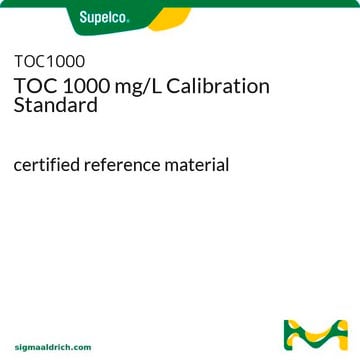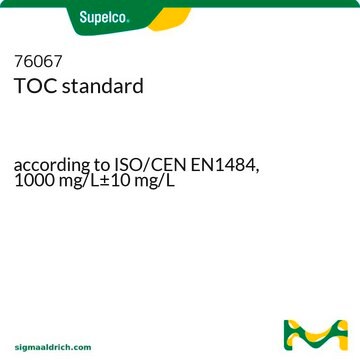60359
Phthalate monobasique de potassium
BioUltra, ≥99.5% (T)
Synonyme(s) :
Acide phtalique monopotassium salt, Biphthalate de potassium, Hydrogénophthalate de potassium, KHP
About This Item
Produits recommandés
Gamme de produits
BioUltra
Pureté
≥99.5% (T)
Forme
powder or crystals
Impuretés
insoluble matter, passes filter test
Perte
≤0.05% loss on drying, 110 °C
pH
3.5-5.0 (25 °C, 0.1 M in H2O)
Pf
295-300 °C (dec.) (lit.)
Solubilité
H2O: 0.1 M at 20 °C, clear, colorless
Traces d'anions
chloride (Cl-): ≤20 mg/kg
sulfate (SO42-): ≤50 mg/kg
Traces de cations
Al: ≤5 mg/kg
As: ≤0.1 mg/kg
Ba: ≤5 mg/kg
Bi: ≤5 mg/kg
Ca: ≤10 mg/kg
Cd: ≤5 mg/kg
Co: ≤5 mg/kg
Cr: ≤5 mg/kg
Cu: ≤5 mg/kg
Fe: ≤5 mg/kg
Li: ≤5 mg/kg
Mg: ≤5 mg/kg
Mn: ≤5 mg/kg
Mo: ≤5 mg/kg
Na: ≤100 mg/kg
Ni: ≤5 mg/kg
Pb: ≤5 mg/kg
Sr: ≤5 mg/kg
Zn: ≤5 mg/kg
Absorption
cut-off at 309 nm in H2O at 0.1 M
Chaîne SMILES
[K+].OC(=O)c1ccccc1C([O-])=O
InChI
1S/C8H6O4.K/c9-7(10)5-3-1-2-4-6(5)8(11)12;/h1-4H,(H,9,10)(H,11,12);/q;+1/p-1
Clé InChI
IWZKICVEHNUQTL-UHFFFAOYSA-M
Vous recherchez des produits similaires ? Visite Guide de comparaison des produits
Application
Code de la classe de stockage
13 - Non Combustible Solids
Classe de danger pour l'eau (WGK)
WGK 3
Point d'éclair (°F)
387.1 °F - Pensky-Martens closed cup
Point d'éclair (°C)
197.3 °C - Pensky-Martens closed cup
Équipement de protection individuelle
Eyeshields, Gloves, type N95 (US)
Certificats d'analyse (COA)
Recherchez un Certificats d'analyse (COA) en saisissant le numéro de lot du produit. Les numéros de lot figurent sur l'étiquette du produit après les mots "Lot" ou "Batch".
Déjà en possession de ce produit ?
Retrouvez la documentation relative aux produits que vous avez récemment achetés dans la Bibliothèque de documents.
Les clients ont également consulté
Notre équipe de scientifiques dispose d'une expérience dans tous les secteurs de la recherche, notamment en sciences de la vie, science des matériaux, synthèse chimique, chromatographie, analyse et dans de nombreux autres domaines..
Contacter notre Service technique








